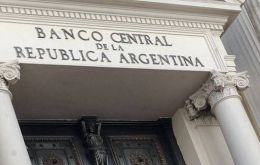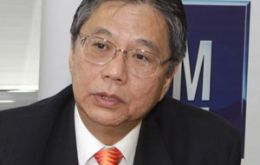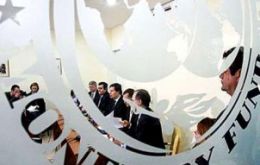MercoPress. South Atlantic News Agency
Economy
-
Tuesday, July 17th 2012 - 19:49 UTC
Chilean village heartfelt thanks for Falklands support

The Chilean village of Lolol in the Colchagua region has sent its heartfelt thanks, in the form of a plaque, to the people of the Falklands and the Chilean Community in the Islands for their very generous support following the devastation of buildings in the area as a result of the earthquake in 2010.
-
Tuesday, July 17th 2012 - 19:37 UTC
Three Paraguayan abattoirs cleared to export boneless beef to Israel

Three Paraguayan abattoirs have been re-licensed by Israel to export boneless beef, according to the Paraguayan Rural Association, ARP, based on information from the country’s livestock and food sanitary services, Senacsa.
-
Tuesday, July 17th 2012 - 19:27 UTC
HSBC grilled in US Senate for lax controls enabling billions of money laundering

The CEO of the U.S. division of the big international bank HSBC is apologizing for lax controls that lawmakers say allowed Mexican drug cartels to launder billions of dollars through the US operation and many other illicit transactions for years.
-
Tuesday, July 17th 2012 - 04:42 UTC
As the dollar clamp tightens in Argentina, the greenback traded at 6.31 Pesos

The US dollar in Argentina soared on Monday and was trading in the “blue” or parallel market at 6.31 Pesos considerable higher than last Friday. The official rate climbed a modest half cent to 4.53 and 4.575 Pesos.
-
Tuesday, July 17th 2012 - 04:39 UTC
Brazilian auto workers begin protests fearing loss of jobs as investment is down

A Brazilian union carried out a 24-hour strike at a General Motors Co factory on Monday to protest dwindling output on an assembly line where workers fear for the future of 1.500 jobs.
-
Monday, July 16th 2012 - 23:59 UTC
IMF cuts world growth forecast; Latam drops from 3.7% to 3.4%

International Monetary Fund on Monday cut its global growth forecast and warned that the outlook could dim further if policymakers in Europe do not act with enough force and speed to quell their region's debt crisis.
-
Monday, July 16th 2012 - 23:55 UTC
Drought stretching across US threatens economies of farming states and food prices

A worst-in-a-generation drought from stretching across the United States is damaging crops and rural economies and threatening to drive food prices to record levels. Agriculture, though a small part (1.2%) of the 15.5 trillion dollars US economy, had been one of the most resilient industries in the past three years as the country struggled to recover from the recession.
-
Monday, July 16th 2012 - 23:48 UTC
Italian banks downgraded but risk-rating agencies analysis are also questioned

UniCredit SpA and Intesa Sanpaolo SpA were among 13 Italian banks that had long-term debt, deposit or issuer ratings cut by Moody’s Investors Service, which cited the government’s weakened creditworthiness.
-
Monday, July 16th 2012 - 23:42 UTC
Manchester United retains title as the world’s most valuable sports team, says Forbes

English football club Manchester United retained their title as the world's most valuable sports team, according to an annual top 50 list released by Forbes on Monday that was dominated by National Football League (NFL) franchises.
-
Monday, July 16th 2012 - 07:24 UTC
Uruguayan Central bank poll shows economy is expected to grow at slower pace

The Uruguayan economy is set to grow 3.57% in 2012 which is below the government’s forecast according to the latest analysts and businesspeople poll published last Friday by the central bank.
